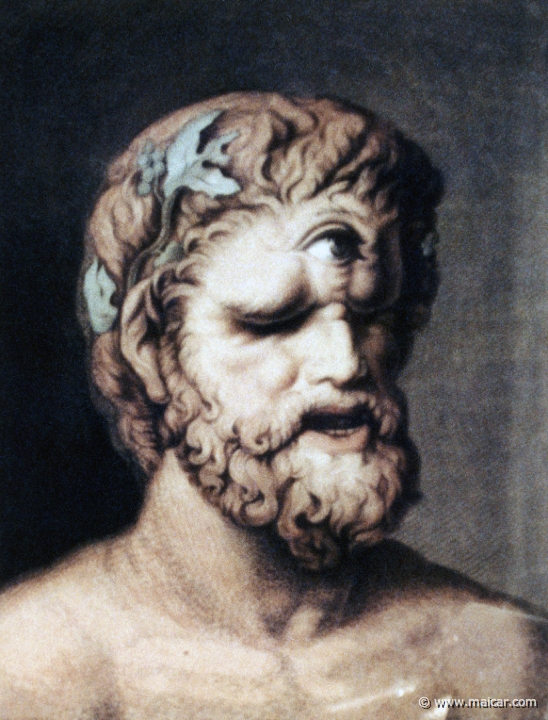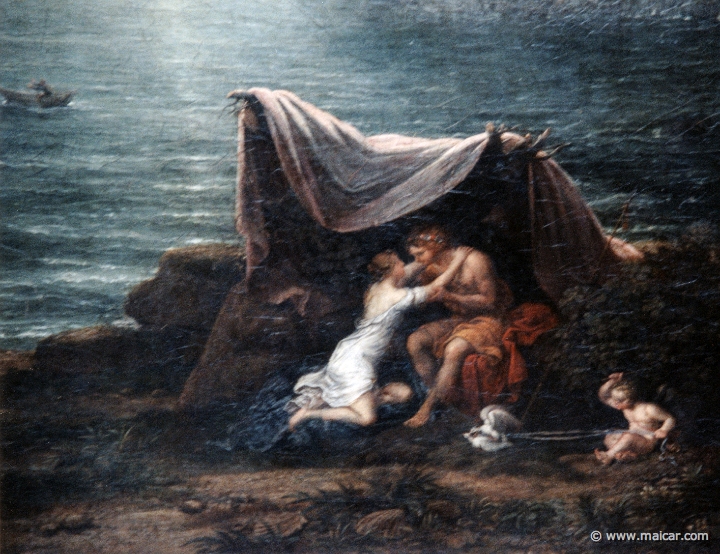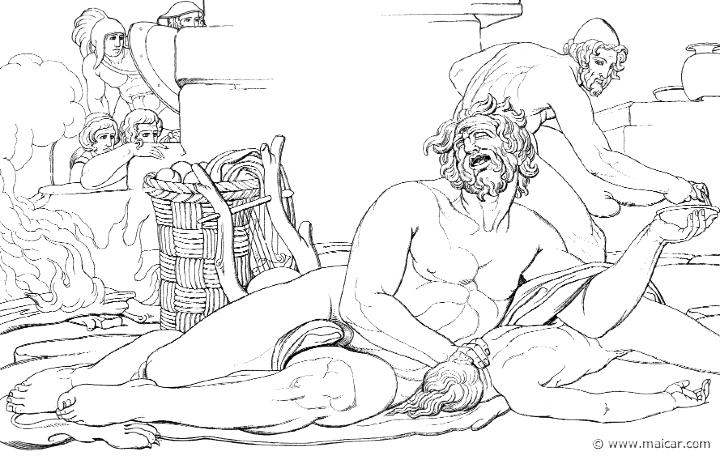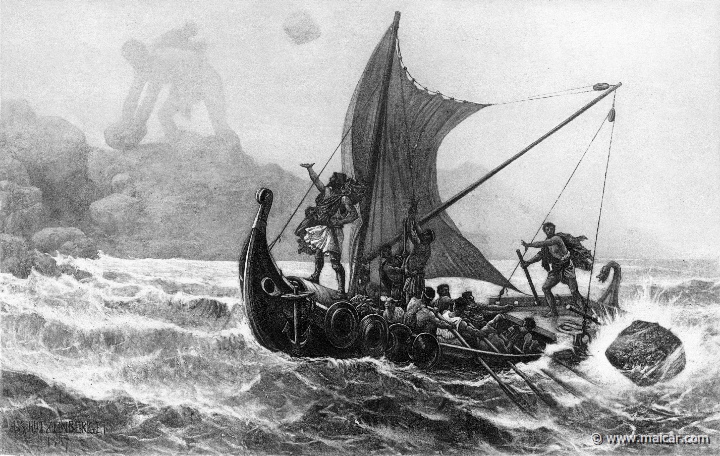|

|
Polyphemus 2. 3717: Johann Heinrich Wilhelm Tischbein, 1751-1829: Polyphem vor 1802. Landesmuseum Oldenburg, Das Schloß.
|
|
|
The Curse of the Cyclops:
"Hear me, Poseidon … If truly I am your son, and you acknowledge yourself as my father, grant that Odysseus, who styles himself Sacker of Cities and son of Laertes, may never reach his home in Ithaca. But if he is destined to reach his native land, to come once more to his own house and see his friends again, let him come late, in evil plight, with all his comrades dead, in someone else's ship, and find troubles in his household." (Polyphemus 2. Homer, Odyssey 9.528).
|
|
The Cyclops Polyphemus 2 was a huge, wild cannibal, who was once in love with the Nereid Galatea 1, and was later blinded by Odysseus.
Ignorant and insolent race
The race of Polyphemus 2 naturally reminds of the CYCLOPES Arges, Brontes 1 and Steropes, who were the children of Gaia; for Polyphemus 2 and those like him, having a single eye in their forehead, are also called Cyclopes. But whereas the children of Gaia were like
the gods (although some say that they were slain by Apollo), and gave Zeus the thunderbolt, Hades a helmet, and Poseidon a trident, the race of Polyphemus 2 was formed by a fierce and uncivilized people, who never planted or ploughed, nor had any assemblies for the making of laws. Instead they lived in caverns, not caring a jot for their neighbors or the gods. And as those who live with an empty mind in a black hole not seldom are very satisfied with themselves, it was perfectly natural for Polyphemus 2 to say:
"We Cyclopes
do not concern ourselves over Zeus … nor any of the rest of the blessed god, since we are far better than they …" (Polyphemus 2 to Odysseus. Homer, Odyssey 9.275).
Achievements of the Cyclopes
And so, being persuaded of their own superiority, they continued their long journey through ignorance and mischief, deprived of all benefits that trades and crafts may provide, and living the lives of cannibals and brutes. For they had no idea of what a ship could do, nor imagined the existence of foreign ports and the overseas traffic that they establish among civilized nations. Instead they tended goats, which is indeed excellent, but even these were wild, for no pathways existed. And as agriculture was still a mystery for them, the whole land was left unsown and untilled. This is what Polyphemus 2 and the other Cyclopes had achieved so far in their island, which some say it was Sicily.
Unavoidable Love
Yet Love makes no judgement of the kind mortals usually do, and cares nothing about development of trades and crafts unless they serve his purposes; and since this god dislikes exceptions, also the brute Polyphemus 2 found himself enamoured. And so the savage who despised the gods, without suspecting it, came under the influence of powerful Love, burning with desire,
and even forgetting flocks and caves.
Telemus' prophecy
It was then, they say, that this wild creature,
for the first time, began to take care of his
appearance, becoming anxious to please. And since Love appeases, the Cyclops,
leaving his fierce nature aside, stopped pursuing
the crews of the ships that landed in the island.
It was then that the seer Telemus came to Sicily
and, having met this unfortunate fellow, foretold:
"That one eye,
which you have in the middle of your forehead, Odysseus will take from you." (Telemus to Polyphemus 2. Ovid, Metamorphoses 13.772).
But on hearing the prophecy, the Cyclops, with his mind choked by an unusual fit of verbal ability, mocked the seer, replying that that could not be, for his eye had already been taken by the nereid Galatea 1.
The Cyclops' love song (I)
They say that when Love gets hold of anybody, he or she becomes instantly a poet or a musician, and so this Cyclops too took his pipe with a hundred reeds, and went on playing and singing his praises to the beautiful Galatea 1, saying that she was whiter than snow, more blooming than the meadows, more sparkling than crystal, smoother than shells worn by the waves, more nimble than the gazelle, sweeter than ripened grapes, and many other things that could have been the envy of such a poet like Publius Ovidius Naso, had he not been able himself to do much better than Polyphemus 2 and all the Cyclopes taken together.
The Cyclops' love song (II)
But as Galatea 1 did not love Polyphemus 2, but instead preferred to rest in the arms of Acis, the son of Faunus 1 and a Symaethian Nymph, the Cyclops sang a second part, achieving in his art a remarkable contrast. For he sang that this same Galatea 1 was more obstinate than a heifer, harder than an oak, falser than water, more immovable than rocks, vainer than a peacock, more cruel than fire, sharper than thorns, deafer than the sea, more pitiless than a snake, and other things that just accomplished poets or Cyclopes in love can put together.
The Cyclops' seductive resources
It was bitter for the Cyclops to perceive how
reciprocity failed; for it was unbelievable for him
not to be loved back, himself loving so much as he
did. He thought, and this is not a Cyclopean
thought only, that it must be some kind of
misunderstanding behind this unhappy circumstance,
and so he came to the conclusion known as
"she-does-not-know-me-well-enough". For if she did,
he reasoned, she could not help but love him and
feel regret for having tried to avoid him. And
besides his love he counted many things to offer
her, such as: a whole mountain-side that he owned,
several caves, apple trees, grapes, chestnuts,
strawberry fields, countless flocks, and many other
things that a poet does not need to imagine, for
they are everywhere for all to see and for a few to
own.
|

|
Acis and Galatea 1. Eros plays with a dove, his mother's bird. 4704: Claude Lorrain 1600-1682 (eigentlich Claude Gelée): Küstenlandschaft mit Acis und Galatea, 1657. Gemäldegalerie Alte Meister, Dresden.
|
|
The killing of Acis
After giving a detailed account of his riches, the Cyclops proceeded to praise his own looks, proud as he was of his size and strength, and then he found it fit to resort to pedigree, reminding the nereid that his father was king over the waters of the sea, where she, as a matter of fact, happened to have her own abode. Despite all his efforts, Polyphemus 2 could not win the nereid's love; for she cared nothing for his genealogical tree, his riches, and even less for his looks. Instead she loved Acis. But one day, the savage spied them and, hurling a rock at the nereid's lover, buried him under it, while Galatea 1 fled in panic, and dived into the sea.
Odysseus
Some time after this crime, there came wandering Odysseus, who, against
his will, had once sailed to fight at Troy, and that now, sailing
with his fleet after the sack of that city, was on
his homeward way. He and his crew had just escaped
from the land of the Lotus-eaters, a people that
lived on vegetable food only. These men had no
intentions of killing Odysseus' friends, but
instead they gave them sweet lotus to taste, and
when they had eaten from the plant, they forgot
everything, wishing to stay, and refusing to return
home. Odysseus forced
them on board, and the fleet sailed away, landing
soon in the country of the Cyclopes. Odysseus' fleet
arrived to the island by night, and the whole crew
slept on the shore; but the next day, when they saw
the mountain goats they went after them and, having
caught more than one hundred, they sat all day
enjoying the newly acquired supply of meat, which
they washed down with the wine they had taken from
the Ciconians.
In the Cyclops' cave
The next day, Odysseus went with his
own ship and crew to explore the territory, and
when he came to a certain place, he left the ship,
selected twelve men in the company, and advanced
with them, leaving the others behind. It was with
these men that Odysseus came to the cave of Polyphemus 2 when he was out tending his sheep, and there they awaited his return, hoping to meet a friendly host. When the Cyclops arrived, he drove his sheep into the cave and sat down to milk the ewes and goats.
Short conversation
His work done, the Cyclops lit up the fire and,
having discovered the strangers, began asking, with
his booming voice, such questions as are customary
in this kind of situation, such as who they were
and where they came from. Odysseus answered him
according to truth, hoping to be backed by the Fame that derived from
having belonged to Agamemnon's army,
which had just destroyed Troy. He ended his speech
by calling upon Zeus, who
avenges the suppliant and the guest and protects
the traveller. However, Odysseus' words did not
make the slightest impression on the mind or heart
of the Cyclops. For he did not care a whit for Zeus, and even less for the
prowesses of King Agamemnon and his men.
Two Achaeans devoured
So without further ado, he seized a couple of
these brave Achaeans that had been in foreign lands
sacking cities, and having dashed their heads
against the floor, tore them limb by limb and
devoured them, washing the meal down with milk. And
being satisfied with such a banquet, he stretched
himself out for sleep; for there was no need for
such a powerful giant to care about the minute
creatures that he intended to eat during his next
meal. Odysseus and his
friends deemed first that the moment had come to
plunge a sword into the Cyclops' chest, but on
second thoughts they realised that it would be
impossible for them to push aside the huge rock
that covered the entrance of the cave.
The Staff of the Cyclops
|

|
Odysseus gives more wine to the Cyclops | od179gen: "Again I handed him the flaming wine. Thrice I brought and gave it him, and thrice he drained it in his folly." (Hom.Od.9.360). Bonaventura Genelli (1798 – 1868).
|
|
That is why they decided to wait. The next day, the procedure was repeated; for Polyphemus 2 snatched yet two Achaeans, after milking his ewes. But this time, being only breakfast time, the Cyclops went away after his meal with his flocks, removing the doorstone to go out and then replacing it immediately. While Polyphemus 2 was tending his animals, Odysseus and
his men planned his downfall. And for this purpose,
they decided to use a staff of green olive-wood
they found in the cave, which for the Achaeans was
like the mast of a ship, and that the Cyclops had
cut to carry about when it had dried out. Odysseus and his men
chopped from it a certain length, sharpened its
point, and put it over the blaze of the fire to
harden; and when they had done this they hid it
under the dung.
Nobody gives him delicious wine
When the evening came, Polyphemus 2 returned, and when his daily business was over he seized two more Achaeans for supper. This time, however, Odysseus offered him a
bowl of wine, which he had
taken with him when he left the ship, inviting the
glutton giant to wash down his meal with it. And as
he found it delicious, he asked for another bowl,
offering Odysseus some
gift in exchange if he would also tell him his
name; and after having drunk the second bowl, he
received a third which he also drank. And when the
Cyclops' wits had been fuddled by the wine, said Odysseus:
"Cyclops … you wish to know the name I bear. I will tell you then, but in return I should like to have the gift you promised me. My name is Nobody. That is what I am called by my mother and father and by all my friends." (Odysseus to Polyphemus 2. Homer, Odyssey 9.364).
The eye lost
One hearing this, Polyphemus 2, answering with his usual humour, replied that, as a gift, he would eat Nobody last, and the rest before him. And this said, he fell asleep vomiting; for even a Cyclops can be knocked down by too much wine. At once, Odysseus and his friends prepared the pole under the ashes to make it hot, and having seized it they drove the sharp end into the single eye of Polyphemus 2, who gave a dreadful shriek while pulling out the stake from his eye.
Entangling words
Polyphemus 2 screamed in such a way that, from every place, the other Cyclopes gathered outside the cave, asking for the reason of such disturbance in the middle of the night, whether it was somebody's treachery or force that attempted to kill him. And he who was in great pain replied:
"O friends,
Nobody is killing me by force or treachery." (Polyphemus 2 to the Cyclopes. Homer, Odyssey 9.408).
And when they heard his reply they answered him
before they went off:
"Well then … if nobody is assaulting you in your solitude, you must be sick. Sickness comes from almighty Zeus and cannot be helped. All you can
do is to pray to your father Poseidon." (The Cyclopes to Polyphemus 2. Homer, Odyssey 9.410).
This is how Odysseus fooled the Cyclops Polyphemus 2, entangling him with both words and deeds.
Slipping out of the cave
|

|
As Odysseus boasts the Cyclops casts stones at his ship. print012: Odysseus defying the Cyclops. Engraving from 1894 by Louis-Frederic Schutzenberger.
|
|
Then the blinded Cyclops removed the doorstone,
hoping to catch the Achaeans trying to slip out of
the cave among the sheep. But Odysseus conceived the
idea of lashing together the bigger animals in
threes, letting the middle one to carry one of his
soldiers under its breast, and those on either side
to protect him. Odysseus himself chose
a full-grown ram, and curled himself under his
belly, laying upside down. The Cyclops passed his
hands along the back of all the animals as he let
them out, and that is why he never noticed that Odysseus and his men were under them. This is how they slipped out of the cave, having ruined Polyphemus 2's single eye.
The boast of Odysseus
Once outside, they drove the sheep right down to
the ship and put to sea. But as boasts often follow
triumphs, Odysseus called the Cyclops from the ship to tease him. And when the blind Polyphemus 2 heard how Odysseus mocked him, he
seized and hurled at them a rock that threatened to
sink the ship. At this, the crew dashed with their
oars, but Odysseus called Polyphemus 2 again, blowing once more his trumpet:
"Cyclops, if
anyone ever asks you how you came by your unsightly
blindness, tell him your eye was put out by Odysseus, Sacker of Cities, the son of
Laertes, who lives in Ithaca." (Odysseus to Polyphemus 2. Homer, Odyssey 9.502).
The Curse of the Cyclops
On hearing this new vaunt, Polyphemus 2 remembered the prophecy of Telemus, and as Odysseus went on
provoking and teasing, the Cyclops being unable,
blind as he was, to hit the ship, lifted his arms
and prayed:
"Hear me, Poseidon … If truly I am your son, and you acknowledge yourself as my father, grant that Odysseus, who styles himself Sacker of
Cities and son of Laertes, may never reach his home
in Ithaca. But if he is destined to reach his
native land, to come once more to his own house and
see his friends again, let him come late, in evil
plight, with all his comrades dead, in someone
else's ship, and find troubles in his
household." (Polyphemus 2. Homer, Odyssey 9.528).
This was the curse that Odysseus' boast earned,
while he and his men left the land of the Cyclopes,
shortly before their arrival to the isle of Aeolus 2, the Ruler of
the Winds.
Another with identical name
Polyphemus 1 is one of the ARGONAUTS.
|